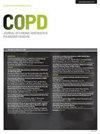通过综合生物信息学分析发现与慢性阻塞性肺病临床特征相关的肠道微生物群
IF 3.1
3区 医学
Q1 Medicine
International Journal of Chronic Obstructive Pulmonary Disease
Pub Date : 2024-04-05
DOI:10.2147/copd.s436551
引用次数: 0
摘要
引言慢性阻塞性肺疾病(COPD)是一种无法治愈的慢性呼吸道疾病,已成为一个重大的公共卫生问题。肠道微生物群的组成与影响慢性阻塞性肺病的重要临床因素之间的关系仍不清楚。本研究旨在确定对慢性阻塞性肺病具有较高临床诊断价值的特定肠道微生物群:方法:通过 16S rDNA 测序分析 COPD 患者和健康人的粪便微生物群。采用随机森林分类法分析不同的肠道微生物群。通过斯皮尔曼相关性分析不同肠道微生物群与临床特征之间的相关性。利用肠道MDisorder数据库构建了微生物群-疾病网络图,以确定影响慢性阻塞性肺病的肠道微生物可能的致病机理,筛选潜在的治疗方法,并指导未来的研究:结果:两组患者的生物多样性无明显差异,但微生物群落结构有显著差异。发现了 15 个丰度差异较大的细菌属,包括 Bacteroides、Prevotella、Lachnospira 和 Parabacteroides。其中,Lachnospira 和 Coprococcus 的相对丰度与吸烟指数呈负相关,与肺功能结果呈正相关。相比之下,Parabacteroides 的相对丰度与吸烟指数呈正相关,与肺功能结果呈负相关。随机森林分类显示,拉赫诺斯弧菌是最能区分慢性阻塞性肺病患者和健康人的菌属,这表明拉赫诺斯弧菌可能是慢性阻塞性肺病的潜在生物标记物。Lachnospira疾病网络图表明,Lachnospira在某些疾病中减少,如哮喘、糖尿病和2019年冠状病毒病(COVID-19),而在其他疾病中增加,如肠易激综合征、高血压和牛皮癣:关键词:慢性阻塞性肺疾病;肠道微生物群;16S rDNA测序;Lachnospira;肠肺轴本文章由计算机程序翻译,如有差异,请以英文原文为准。
Promising Intestinal Microbiota Associated with Clinical Characteristics of COPD Through Integrated Bioinformatics Analysis
Introduction: Chronic obstructive pulmonary disease (COPD), an incurable chronic respiratory disease, has become a major public health problem. The relationship between the composition of intestinal microbiota and the important clinical factors affecting COPD remains unclear. This study aimed to identify specific intestinal microbiota with high clinical diagnostic value for COPD.
Methods: The fecal microbiota of patients with COPD and healthy individuals were analyzed by 16S rDNA sequencing. Random forest classification was performed to analyze the different intestinal microbiota. Spearman correlation was conducted to analyze the correlation between different intestinal microbiota and clinical characteristics. A microbiota-disease network diagram was constructed using the gut MDisorder database to identify the possible pathogenesis of intestinal microorganisms affecting COPD, screen for potential treatment, and guide future research.
Results: No significant difference in biodiversity was shown between the two groups but significant differences in microbial community structure. Fifteen genera of bacteria with large abundance differences were identified, including Bacteroides, Prevotella, Lachnospira, and Parabacteroides. Among them, the relative abundance of Lachnospira and Coprococcus was negatively related to the smoking index and positively related to lung function results. By contrast, the relative abundance of Parabacteroides was positively correlated with the smoking index and negatively correlated with lung function findings. Random forest classification showed that Lachnospira was the genus most capable of distinguishing between patients with COPD and healthy individuals suggesting it may be a potential biomarker of COPD. A Lachnospira disease network diagram suggested that Lachnospira decreased in some diseases, such as asthma, diabetes mellitus, and coronavirus disease 2019 (COVID-19), and increased in other diseases, such as irritable bowel syndrome, hypertension, and bovine lichen.
Conclusion: The dominant intestinal microbiota with significant differences is related to the clinical characteristics of COPD, and the Lachnospira has the potential value to identify COPD.
Keywords: chronic obstructive pulmonary disease, intestinal microbiota, 16S rDNA sequencing, Lachnospira, gut-lung axis
Methods: The fecal microbiota of patients with COPD and healthy individuals were analyzed by 16S rDNA sequencing. Random forest classification was performed to analyze the different intestinal microbiota. Spearman correlation was conducted to analyze the correlation between different intestinal microbiota and clinical characteristics. A microbiota-disease network diagram was constructed using the gut MDisorder database to identify the possible pathogenesis of intestinal microorganisms affecting COPD, screen for potential treatment, and guide future research.
Results: No significant difference in biodiversity was shown between the two groups but significant differences in microbial community structure. Fifteen genera of bacteria with large abundance differences were identified, including Bacteroides, Prevotella, Lachnospira, and Parabacteroides. Among them, the relative abundance of Lachnospira and Coprococcus was negatively related to the smoking index and positively related to lung function results. By contrast, the relative abundance of Parabacteroides was positively correlated with the smoking index and negatively correlated with lung function findings. Random forest classification showed that Lachnospira was the genus most capable of distinguishing between patients with COPD and healthy individuals suggesting it may be a potential biomarker of COPD. A Lachnospira disease network diagram suggested that Lachnospira decreased in some diseases, such as asthma, diabetes mellitus, and coronavirus disease 2019 (COVID-19), and increased in other diseases, such as irritable bowel syndrome, hypertension, and bovine lichen.
Conclusion: The dominant intestinal microbiota with significant differences is related to the clinical characteristics of COPD, and the Lachnospira has the potential value to identify COPD.
Keywords: chronic obstructive pulmonary disease, intestinal microbiota, 16S rDNA sequencing, Lachnospira, gut-lung axis
求助全文
通过发布文献求助,成功后即可免费获取论文全文。
去求助
来源期刊

International Journal of Chronic Obstructive Pulmonary Disease
RESPIRATORY SYSTEM-
CiteScore
5.10
自引率
10.70%
发文量
372
审稿时长
16 weeks
期刊介绍:
An international, peer-reviewed journal of therapeutics and pharmacology focusing on concise rapid reporting of clinical studies and reviews in COPD. Special focus will be given to the pathophysiological processes underlying the disease, intervention programs, patient focused education, and self management protocols. This journal is directed at specialists and healthcare professionals
 求助内容:
求助内容: 应助结果提醒方式:
应助结果提醒方式:


